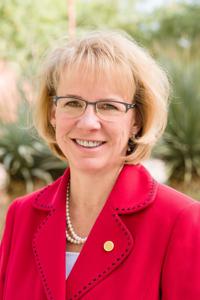When Raytheon announced last month that it was adding 2,000 new jobs to its Tucson facility, we at the University of Arizona were delighted. As a long-time partner in research and development with the company, we applaud its commitment to job creation in the state of Arizona, as well as the support provided by our community and government that facilitated its success.
But we are also thrilled because of what it means for our students, because Raytheon regularly hires University of Arizona graduates. As a matter of fact, the UA is the No. 1 source nationally for engineers for all four of Raytheon’s business divisions nationwide.
Workforce development is a central tenet of the student experience at the University of Arizona. We pride ourselves on our commitment to the future of our students by connecting our graduates to employment or graduate study — and we have taken this commitment one step further. Our 100% Engagement initiative strives to create opportunities for our students to apply their classroom learning in real-time experiences that prepare them for tomorrow’s workforce.
We are home to the No. 2 physical sciences program in the nation (out of the 906 surveyed by the National Science Foundation), and these sciences are the basis of technological innovation on which high-tech companies like Raytheon depend. The UA also boasts one of the few colleges of optical sciences in the world and our College of Engineering is ranked among the top 50 engineering schools, with all 14 programs preparing students for the kinds of jobs Raytheon has created.
But our link to industry partners like Raytheon goes beyond workforce development. We also work with companies to further leverage our excellence in basic science and technology development.
For example, we recently established a Defense and Security Research Institute to facilitate the application and deployment of these capabilities to our national needs and to support Arizona’s installations and industry sector, including companies such as Raytheon, Honeywell and General Dynamics. Our Water & Energy Sustainable Technology Center, located directly on Pima County’s water-treatment campus, is a collaboration between industry, academia and local government working together to enable new technologies for water sustainability.
The UA has also developed career-focused educational programs tailored to industry needs, such as Mining 360, an online graduate certificate program developed when Caterpillar moved to Tucson.
The value of a top-tier public research university in our community is clear. Our students are immersed in cutting-edge research while creating the same economic impact as hosting two Super Bowls. Last year, 14 companies were created from university research and 95 university research technologies were licensed to businesses.
With the largest and most-diverse research and development portfolio in the state, the University of Arizona is doing some of the most groundbreaking research in the country — including leading a mission to an asteroid and being selected by the National Institutes of Health as one of only four prime awardees in the $215 million Precision Medicine Initiative, which will create the next era of clinical care through the development of personalized treatments.
We are thrilled at the news that Raytheon, a company whose partnership we value so highly, is creating new opportunities and expanding Tucson’s job market. Together, the contribution to Arizona’s economic vitality is truly boundless. We at the UA are proud to continuously work with Raytheon and look forward to future opportunities this announcement presents for our university, our graduates and our community.




